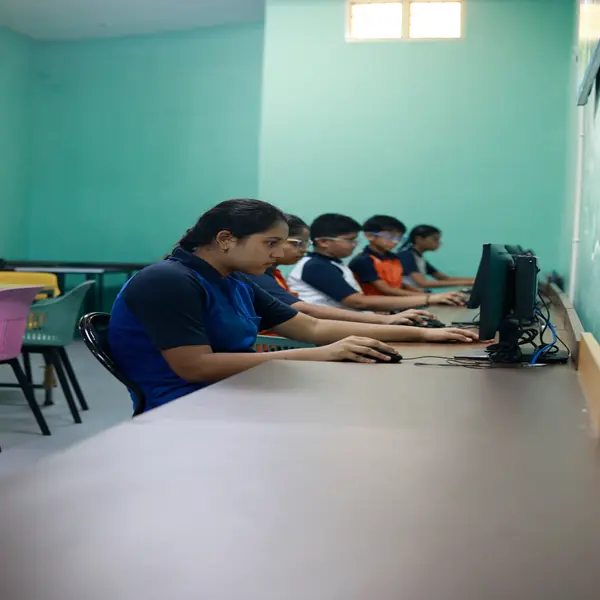Admission Enquiry


In today's digital world, social media is a central part of students' lives. While it helps them connect with friends, learn new things, and have fun, there are also risks involved. To ensure students use these platforms safely and responsibly, it’s essential to understand how to navigate them wisely. This guide by the best school in Jaipur will assist in providing social media safety for students to stay informed and practice responsible online behaviour.
Social media offers many benefits, like staying in touch with friends and exploring new ideas. However, it can also expose students to dangers such as cyberbullying, inappropriate content, and privacy issues. These risks can impact mental health, self-esteem, and even future opportunities like college admissions and job prospects.

Social media can create a false impression of reality. It’s important to remember that what you see online is often an edited version of real life. People tend to share their best moments, which can lead to unhealthy comparisons. Always question the information you see, check its reliability, and avoid falling into the trap of feeling less because of someone else's online presence.
Before posting anything on social media, take a moment to think about the long-term effects. Posts can affect your reputation and might come back to haunt you when applying for college or a job. Always ask yourself, "Is this something I want everyone to see, now and in the future?"
Make sure you review the privacy settings on all your social media accounts. It’s best to limit who can see your posts to people you trust, like close friends and family. Adjusting privacy settings regularly helps protect your personal information and keeps you in control of what others can see.
It’s easy to make friends online, but not everyone is who they claim to be. Only accept friend requests from people you know personally and trust. It’s also a good idea to go through your friend list from time to time and remove anyone who seems suspicious or whom you no longer know.
If you come across content that makes you uncomfortable or violates platform rules, don’t hesitate to report it. Social media platforms usually have features for reporting inappropriate content, and taking action can help create a safer online environment for everyone.
Spending too much time on social media can negatively affect your mental health and academic performance. Set limits for yourself, such as using built-in tools that track screen time or taking breaks from social media to focus on other important activities like studying, hobbies, or spending time with family and friends. A balanced life ensures social media doesn’t take over your day.
Also Read:- Importance of Nutrition and Sleep for School Performance
Cyberbullying is one of the biggest dangers students face online. It involves bullying, harassment, or spreading harmful rumours through social media platforms. Here’s how you can protect yourself and others:
Just as in real life, being kind and respectful is crucial on social media. Avoid participating in or encouraging negative behaviour, and always think about how your words might affect someone else.
If you see someone being bullied online, don’t stay silent. Let the person know you support them and encourage them to seek help. Report the bully to the platform’s administrators, and if needed, talk to a trusted adult.
If you’re a victim of cyberbullying, it’s important not to keep it to yourself. Reach out to a trusted adult, like a parent, teacher, or school counsellor, who can help you handle the situation and guide you through the steps to protect yourself.

In addition to avoiding cyberbullying, keeping your personal information safe is a key part of staying safe on social media. Here are some important privacy tips:
Take the time to read and understand the privacy policies of the social media platforms you use. This will help you know what kind of data is being collected and how it’s used or shared. Being aware of how your information is handled will allow you to make informed decisions about what to share.
Ensure your social media accounts are protected with strong, unique passwords. Avoid using the same password for multiple accounts, and never share your password with anyone. Changing your passwords regularly adds an extra layer of security to your online presence.
Be careful about sharing sensitive details like your full name, address, phone number, or school name online. This information can be misused by people with harmful intentions. Only share personal information with trusted people, and avoid making it publicly visible.

Parents and teachers play a vital role in social media safety for students online. Here’s how they can assist:
Talk openly with children about their online activities. Encourage them to share their experiences and let them know they can approach you if they ever feel uncomfortable or face problems online.
Social media trends and dangers evolve quickly. Parents and teachers should stay informed about the latest social media platforms and online safety issues. Schools or community organizations may offer resources, workshops, or online courses to help you stay updated on these topics.
Keeping an eye on a child’s social media usage helps prevent issues like cyberbullying or exposure to harmful content. However, monitoring should be done respectfully, ensuring the child’s privacy isn’t completely invaded.
Source:- Cyberbullying Research Center
Social media is a powerful tool, but with great power comes responsibility. By following these social media safety tips, students can enjoy social media while avoiding its potential dangers. Always remember to be kind, think before you post, and stay aware of who you’re interacting with online. For parents and teachers, providing guidance and staying informed will help keep students safe and ensure they use social media responsibly.
Staying safe on social media is everyone’s responsibility. Let’s work together to create a positive and secure online experience!